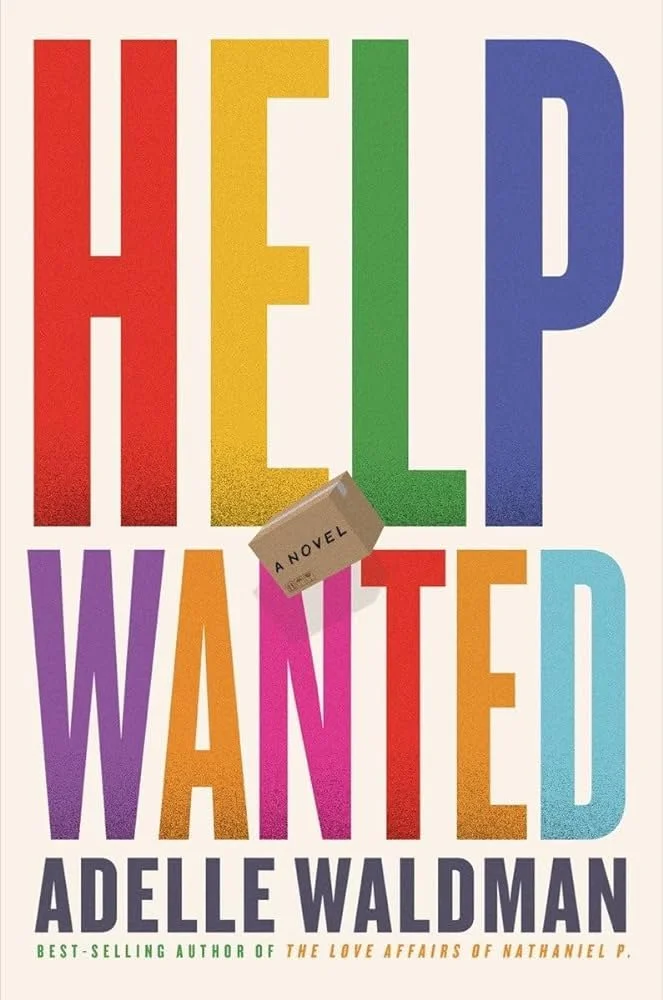REVIEW: Low-Wage Retail Workers Finally Get the Vivid Novel They Deserve
/Help Wanted
By Adelle Waldman
Norton, 276 pp.
By James Graff
If you harbor any uncertainty about why so many Americans are unhappy about their working lives in this period of generation-beating low unemployment, you’ll find plenty of answers in Adelle Waldman’s funny and brilliant second novel, Help Wanted. Airing the real world of low-wage work, Waldman shows how its dysfunction and instability skews the livelihoods of her deftly captured characters –- and millions of other all-but-invisible workers like them.
Help Wanted focuses tightly on the dozen or so employees who unload and sort the merchandise on the huge truck that arrives before dawn every morning at the loading dock of Town Square Store #1512, located in an upstate New York town that has fallen on hard times since the IBM plant shut down.
Known as the Movement Team, they are at the bottom of the totem pole at Town Square, a Target-like general merchandiser that prizes its middle-brow appeal. The salespeople call them the roaches, “because they descended on the store in the dark of night, then scattered at eight, when the customers arrived.”
The workers all want more hours, but Town Square deliberately keeps them from getting them so it doesn’t have to pay for the ever-dwindling employee benefits that come with full-time work. Other opportunities are scarce in Potterstown –- and besides, the members of the Movement Team have pressing concerns of their own.
Nicole, a 23-year-old with a baby and an unemployed boyfriend, has a food stamp card that isn’t working. Travis just got out of prison, can’t get a driver’s license, and has a newborn to feed. Val wants a better job so she and her wife can afford child care for their son, who now has to stay with “grandma playing talk shows and The People’s Court at top volume.” Raymond, a half-Filipino with a congenitally winking left eye, has a girlfriend so troubled by their relationship that she just spent the electricity-bill money on pills.
But there is one problem these workers at the coalface of America’s consumer-driven economy have in common: Meredith, a middle manager whose capricious demands and relentless self-interest adds an extra, unbearable fillip of misery to their working lives. She’s the kind of boss who “loves to use terms not usually uttered outside corporate’s training videos,” and she is on the move: Store #1512’s well-liked manager, Will Santos, is being promoted to a unit in Connecticut, and Meredith wants his job.
The plot centers on Team Movement’s fitful and wryly comic efforts to help her get it. That way she’d at least be out of their hair, and maybe one of them can move up a notch into the relative nirvana of full-time employment.
They reach a shaky agreement to sing Meredith’s praises to the trio of corporate bosses coming to Potterstown to decide who should run the store. But before that, they have to pull a few overnight shifts –- an exercise Meredith infuriatingly labels a “Smart Huddle” --– to clear out the warehouse.
The Movement Team’s scheme doesn’t work out exactly as planned. But its development is so readable, so believable and so politically astute that it’s no surprise to learn that Waldman spent months on a morning big-box shift much like the one she describes. That’s how she earned the insight to examine the twists and turns of her characters’ lives with cool compassion and without condescension.
These doughty survivors are negotiating predicaments and nursing hurts very different from the ones Waldman described in her broadly acclaimed first novel, The Love Affairs of Nathaniel P., about the perils of dating in the self-absorbed world of 30-something Brooklyn literati.
Diego, for instance, gets to wondering how Milo and Raymond can afford the pay-per-view Ultimate Fighting bouts they always talk about, and registers that they both live rent-free with their mothers –- profiting, however modestly, from inherited assets that Diego, Ruby and many other Black Americans lack. Milo can throw a truck like nobody else –- even toss merchandise out onto the belt in an order that builds a subversive narrative. But he’s sure his ability to master that physical job has kept him from getting a promotion he deserved.
Meredith isn’t the real problem, Waldman subtly makes clear. Behind her lurk the harsh realities of a retail sector sapped by the explosive growth of a Seattle-based company Town Square management is loath to even name: they call it “the online retailer.” With no legacy costs, it had tech-sector investors who didn’t care about profits or expect dividends. It could invest in state-of-the-art inventory control systems instead of retail real estate near where people actually lived.
Now Town Square is losing its “middle-class, college-educated shoppers who found Walmart depressing” but gleefully save money by buying stuff online “from a tech start-up, as if it were another cool import from a cool part of the country, like strong coffee and grunge music.”
Analogies to other imploding sectors of the economy aren’t hard to conjure up. Waldman’s book is much better written–and of course far funnier–than Upton Sinclair’s The Jungle, the most famous American j’accuse about life in labor’s trenches. Sinclair’s take on Chicago’s meatpacking industry more than a century ago led to new laws on food standards and meat inspection. The work environment Waldman lays out with such precision and empathy isn’t nearly as dangerous or extreme, yet the prospect of reforming it much seems infinitely more remote. Help Wanted makes a start by opening our eyes to the precarious world behind the “employees only” double doors of big-box America.
James Graff is a Washington-based writer










